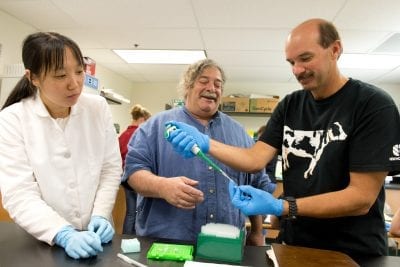NEW! Genetic Engineering Curriculum Downloads - Formal and Non-formal Curriculum Available
Curriculum Download
Please fill out this form to download the Genetic Engineering/PD-STEP formal and/or non-formal curriculums.

The Science of GMOs Unraveled
The American public is growing increasingly skeptical about the safety of genetically modified (GM) foods. Despite consensus in the scientific community that foods containing GM ingredients are safe, nearly half of Americans believe otherwise. Younger adults are also more likely to regard GM foods a health risk.
In order to address misunderstandings about GM foods and provide information about the applications of genetic engineering in agriculture and other fields, a team is developing a program to enhance science literacy for educators and young adults. The team is collaborating to create a standards-based curriculum and laboratory-based professional development for secondary school teachers on genetic engineering. The project aims to build the knowledge and confidence of educators and provide them with materials to deliver lessons related to genetic engineering in their classrooms.
High school teachers will participate in training at the Storrs campus, where they will utilize laboratory resources and build connections with academia and industry professionals. The networking opportunity will also allow educators to share career opportunities in the field of genetics with students.
In addition to the professional development workshop, the program will prepare simpler exercises that can be taught outside of classroom and without the resources of a lab setting, such as during 4-H youth activities, to introduce scientific concepts.
Read the full article at http://bit.ly/UConn_PDSTEP.
Teacher Resources: Take a look at these helpful guides
UConn Molecular Biology Teaching Resources
Credibility of Sources and GMOs
FDA: Agricultural Biotechnology
National Agriculture in the Classroom Homepage
- Agricultural Literacy Curriculum Lesson Plans:
The Ronald Laboratory: Crop Genetics & Scientific Literacy - Education and Policy
This work is supported by Agriculture and Food Research Initiative Professional Development for Secondary Teachers and Education Professionals Program Grant #2019-68010-29122 from the USDA National Institute of Food and Agriculture.